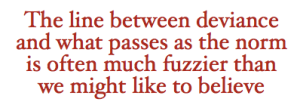Calling out trolls and pulling up roots
 I can always count on my PreventConnect web conference partner, Annie Lyles of Prevention Institute, to send me fabulous reading material. Today, she sent me Let’s call trolling what it really is with the note, “I remember thinking you might have some opinions.” Indeed I do.
I can always count on my PreventConnect web conference partner, Annie Lyles of Prevention Institute, to send me fabulous reading material. Today, she sent me Let’s call trolling what it really is with the note, “I remember thinking you might have some opinions.” Indeed I do.
As I told Annie, I’ve always perceived the word “troll” as pretty severe when used in a social media context (my feelings on trolls as magical beings are for another blog post). At the same time, I’m one for naming behaviors, so the push to call trolling out more specifically appeals. And while that’s a big part of the first half of the article, I honed in on this:
But on both ends of the spectrum of sexism and misogyny, the operating assumption is that women’s thoughts, experiences, and basic sense of safety (or at least comfort) don’t matter, or simply matter less. It’s much easier to see why this is a problem when the behaviors in question are outrageous, coordinated, and extreme. But they are just as damaging when they are defended or minimized and in the process normalized as something women should expect—and therefore accept—by virtue of their gender.
That’s when my prevention radar went off. True, trolls most often behave in explicitly sexist and misogynistic ways, and we need to name that. In addition, as Whitney Phillips urges, “if we really want to do something about the worst perpetrators, we would be well-advised to consider just how deep the problem actually goes.” That is what we as preventionists are charged with. And that’s what we discuss in our web conferences with Prevention Institute. In From Foundations to the Future: A prevention approach to sexual and domestic violence (register for the June 2nd session, back by popular demand, here), just last week, Annie and her colleague Tanya Rovira-Osterwalder helped us look at the roots of the problem. Well this article describes one huge root we must pull.
Enough from me – read Whitney Phillip’s article here, and let’s redefine the norm.
